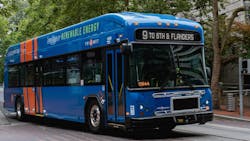TriMet’s BEBs begin service throughout Portland, Ore.
TriMet’s new battery-electric buses (BEB) have begun providing services to residents throughout Portland, Ore.
The agency notes 24 next-generation BEBs are entering service with TriMet this year. The first BEB began welcoming riders aboard Line 9-Powell in July, offering a smooth, quiet and comfortable ride between downtown Portland and the Gresham Central Transit Center. The agency will roll out more new BEBs on more lines in the coming weeks.
TriMet purchased the BEBs from GILLIG, a bus manufacturer headquartered in Livermore, Calif. GILLIG built the buses at its manufacturing facility in the San Francisco Bay Area and drove them about 650 miles up Interstate 5 to Portland earlier this year.
The bus electric
TriMet says GILLIG outfits its BEBs with six lithium-ion battery packs. TriMet recharges the batteries every time a bus returns to its Powell Operations Facility so it’s ready to roll out again the next day.
With support from the federal government and Portland General Electric, the agency says it has been installing charging stations for the BEBs. Most recently, TriMet added 24 charging stations at its Powell Facility in outer southeast Portland.
TriMet notes in place of an internal combustion engine, every BEB has a powerful electric motor. The motor runs on battery power, with a range of more than 150 miles on a single charge.
The new BEBs have 33 percent more battery capacity than the previous generation of GILLIG BEBs TriMet first introduced in 2021. They will also be able to charge on the go. Like the agency’s short-range New Flyer BEBs, which the agency first introduced in 2019, they’re equipped with overhead charging rails for fast charging.
As the agency rolls out the BEBs, TriMet is replacing older diesel buses that have reached the end of the road with the agency after many years of service. The 24 new BEBs are joining 10 BEBs that were already in service with TriMet, more than tripling the number of zero-emissions buses in the agency’s fleet.
Catching the wave of the future
TriMet has set a goal of a full transition to zero-emissions buses by 2040. The 24 BEBs from GILLIG are paid for with state and federal funding.
The Federal Transit Administration awarded TriMet a $39 million grant this summer to help the agency continue moving toward a fully zero-emissions fleet. With the grant, the agency plans to purchase 14 hydrogen fuel-cell electric buses — a first for TriMet — before the end of this decade.
The 60-foot articulated fuel-cell electric buses will run along 82nd Ave., one of the busiest traffic corridors in the region. The grant will also pay for the infrastructure and training TriMet needs to support the buses, including more upgrades for the Powell Operations Facility.
The agency also received a $25 million grant from the U.S. Department of Transportation this summer for the development of its Columbia Operations Facility. The site supports the agency’s transition to zero-emissions buses, including fuel-cell electric buses
